 BT has today set-up a new division, known as OpenReach. They’ve been under pressure from some time from competitors and regulators to curb their monopolistic tendencies (they still own over 85% if the infrastructure in the UK). There has even been talk of splitting BT up – although OfCom has currently reject this.
BT has today set-up a new division, known as OpenReach. They’ve been under pressure from some time from competitors and regulators to curb their monopolistic tendencies (they still own over 85% if the infrastructure in the UK). There has even been talk of splitting BT up – although OfCom has currently reject this.
BT’s response is OpenReach. A division that runs the copper in the ground, which will give equal access to BT Wholesale (who can sell it on with services to BT Retail and others) and non-BT operators in the local loop unbundling (LLU) game (such as Bulldog, Easynet etc). OpenReach (Don’t you find that Open seems to be BT’s buzzword – OpenWorld was first, perhaps BT Open will be next, then all their divisions will convert with the word Open tacked to it) will still be a division of BT Group (maybe now OpenGroup?) but will be run by the EAB (Equal Access Board) which is made up of both BT, and more importantly, non-BT people.
Smoke and mirrors
Though this is a look like a commendable approach, it may also be a huge gambit that BT are playing in order to keep everyone’s eye off their real game.
Ofcom (the Super Regulator) are under tremendous pressure to maintain a level telecoms playing field, this is added to by the UK government putting further pressure on them, as broadband is seen to be a key economic marker. This has made Ofcom wield a double-edged sword – forcing BT to maintain wholesale pricing on their ADSL services (i.e. not lower them), until there at least 1.5m unbundled lines in the UK.
At first glance this sounds like a good idea, as it gives the LLU operators a chance to launch their services without BT suddenly reacting and putting everyone out of business by massive wholesale price cuts. However, the other side of this is that there are 5m+ BT Wholesale customers (via broadband ISPs) out there now who won’t see massive price cuts.
What’s good for LLU is probably not so good (at least in the short term) for the majority of broadband users in the UK – and by implication the population of the UK.
OpenReach doesn’t help those users either, in fact it just adds another level of confusion.
Distraction
BT’s competition now have to worry about what OpenReach are up to, and gives the opportunity for another several years of arguments and Ofcom intervention. While everyone’s arguing with each other (sadly not BT), they are taking their eye off BT’s long term plans. This is a big mistake, and if they don’t correct this, they won’t be in business in the future.
BT to a degree want this, they have teams of regulatory lawyers who, after long period of discussion, can agree to certain things and make life look lovely in one sentence, while tying things in red-tape in another. It’s well worth noting that BT have a bigger regulatory department than Ofcom have staff.
What’s to be done with LLU in the UK?
LLU operators are slowly gaining a foothold and launching innovative services, leaving BT to catch-up. Unfortunately there are less than 100,000 unbundled lines compared to BT’s 5m+ DSL customers and their 25m connected premises.
To make LLU economic, the operators are picking exchanges that have a high population density and the ‘right’ demographic – leading to all the operators tending to pick the same exchanges. There are 5,600 digital local exchanges (DLEs) in the UK, even an operator with a LOT of money is likely to target less than 1,000 of them, most seem to be averaging around 400.
The real boost to LLU that’s needed is co-operation. If all the non-BT operators pooled their resources and built a operator-neutral broadband network that any of them could run services over, they would end up with a network that would start to compete with BT’s. Telecoms operators and ISPs need to realise the real competition isn’t each other, but BT.
21CN, BT’s OpenReach killer?
In the medium term BT are rolling out their 21CN (21st Century Network) which links all of BT’s DLEs using IP. All phone calls become VoIP (voice over IP) and every home has a high speed broadband IP connection.
BT will also launch a range of services to go with their new IP only offering such as IPTV (Internet TV).
By 2009 BT expect to turn off the existing PSTN (public switched telephone network) and all of the UK will be running on the IP 21CN.
This will be great for consumers, potentially 24Mb/s broadband into every home, plug in a VoIP phone and it will just work, High Definition (HD) TV into every bedroom. The downside is it has the potential to put all of BT’s competition out of business in one fell swoop.
BT deregulated with VoIP
BT have been very clever. They’ve supported Ofcom in their views of not heavily regulating VoIP, allowing “new wave” VoIP providers to flourish without being burdened in regulatory red-tape.
Seems strange doesn’t it? Until you realise that when BT’s 21CN rolls-out, it will ALL be VoIP. Suddenly BT are free to do things with it that under the current telecoms environment they might face regulatory scrutiny.
Ofcom are then in a difficult position as they can’t make one rule for BT and another for everyone else. Their choice? They leave VoIP lightly regulated, or make it very regulated and make it difficult for all those new players.
BT OpenReach is a good start, is it too little too late?
 UPDATEDSky has today confirmed that it is offering £211m to buy publicly listed UK ISP, Easynet. This follows a period of general speculation, after Easynet issued an official statement on Monday past that they were subject to a possible offer.
UPDATEDSky has today confirmed that it is offering £211m to buy publicly listed UK ISP, Easynet. This follows a period of general speculation, after Easynet issued an official statement on Monday past that they were subject to a possible offer.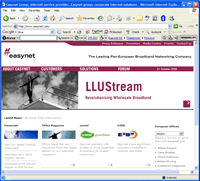 Sky will gain income from broadband subscription and possibly entice further subscribers to their TV service taking them to their stated aim of 10m. Far more important is a new channel to deliver content through – one they have total control over. They like that.
Sky will gain income from broadband subscription and possibly entice further subscribers to their TV service taking them to their stated aim of 10m. Far more important is a new channel to deliver content through – one they have total control over. They like that. Sky have been mulling about an IPTV service for a while. They were in discussions with THUS who provide the telecoms back-end for their SkyTalk service and helped Sky with their WapTV services, they were talking about doing an IPTV trial with THUS, but THUS pulled out of the LLU arena due to lack of cash. They were looking at spending £20m+ on just a trial.
Sky have been mulling about an IPTV service for a while. They were in discussions with THUS who provide the telecoms back-end for their SkyTalk service and helped Sky with their WapTV services, they were talking about doing an IPTV trial with THUS, but THUS pulled out of the LLU arena due to lack of cash. They were looking at spending £20m+ on just a trial.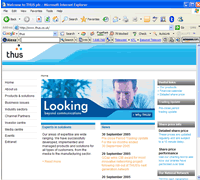 Sky are also in an odd position as they’ll probably utilise MPEG-4 as the coding system, which means they’ll have to modify (or supplement) their existing transmission systems which are all based on MPEG-2. They’ll also have to introduce a new IP based set-top-box. However they’ll have to be carefull as to not make it too feature rich compared to existing STB’s used to decode the satellite transmissions or existing users will want to migrate to the broadband version – which will cost Sky a huge ammount as the exisitng boxes are considerably subsidised.
Sky are also in an odd position as they’ll probably utilise MPEG-4 as the coding system, which means they’ll have to modify (or supplement) their existing transmission systems which are all based on MPEG-2. They’ll also have to introduce a new IP based set-top-box. However they’ll have to be carefull as to not make it too feature rich compared to existing STB’s used to decode the satellite transmissions or existing users will want to migrate to the broadband version – which will cost Sky a huge ammount as the exisitng boxes are considerably subsidised.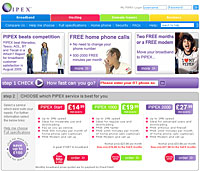 There still seems to be plenty of cash slopping around the broadband sector, as PIPEX has just waved its weighty wad in the direction of Freedom to Surf (F2S) and bought the company for £10m.
There still seems to be plenty of cash slopping around the broadband sector, as PIPEX has just waved its weighty wad in the direction of Freedom to Surf (F2S) and bought the company for £10m. It’s uncertain whether existing Freedom2Surf customers already using LLU via the EasyNet LLUStream range will stay where they are or be shunted on to a PIPEX LLU product.
It’s uncertain whether existing Freedom2Surf customers already using LLU via the EasyNet LLUStream range will stay where they are or be shunted on to a PIPEX LLU product.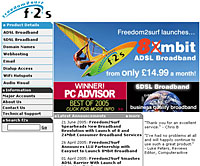 Peter Dubens, Chairman of PIPEX, said: “In the light of our recent decision to unbundle an initial 60 exchanges, we are very pleased to add F2S to the PIPEX group, which will further increase the density of customers around each exchange, thus improving the return on capital and enabling us to offer higher speeds to a greater number of our customers. F2S’s customers will be able to benefit from our extensive network and the broad range of services we provide.”
Peter Dubens, Chairman of PIPEX, said: “In the light of our recent decision to unbundle an initial 60 exchanges, we are very pleased to add F2S to the PIPEX group, which will further increase the density of customers around each exchange, thus improving the return on capital and enabling us to offer higher speeds to a greater number of our customers. F2S’s customers will be able to benefit from our extensive network and the broad range of services we provide.”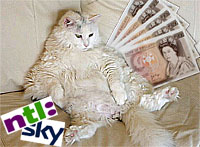 Britain’s biggest cable operator, NTL, has agreed to shell out an eye-watering $6 billion (~£3.42bn, ~€5bn) for Telewest Global.
Britain’s biggest cable operator, NTL, has agreed to shell out an eye-watering $6 billion (~£3.42bn, ~€5bn) for Telewest Global.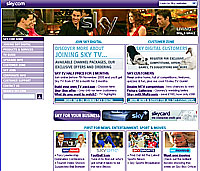 According to a statement – which ends three years of speculation about the merger – Simon Duffy, NTL’s chief executive, will lead the combined company.
According to a statement – which ends three years of speculation about the merger – Simon Duffy, NTL’s chief executive, will lead the combined company.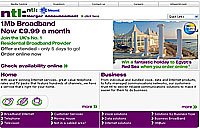 Chairman Cob Stenham can expect his bank balance to increase to the tune of $20m (~£11.4m, ~€16.77m) while chief executive Barry Ellison will no doubt cackle wildly with joy as $17m (~£9.7m, ~€14.25m) rolls into his coffers.
Chairman Cob Stenham can expect his bank balance to increase to the tune of $20m (~£11.4m, ~€16.77m) while chief executive Barry Ellison will no doubt cackle wildly with joy as $17m (~£9.7m, ~€14.25m) rolls into his coffers. BT has today set-up a new division, known as OpenReach. They’ve been under pressure from some time from competitors and regulators to curb their monopolistic tendencies (they still own over 85% if the infrastructure in the UK). There has even been talk of splitting BT up – although OfCom has currently reject this.
BT has today set-up a new division, known as OpenReach. They’ve been under pressure from some time from competitors and regulators to curb their monopolistic tendencies (they still own over 85% if the infrastructure in the UK). There has even been talk of splitting BT up – although OfCom has currently reject this.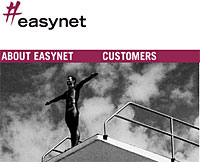 Like Popeye with a mouthful of spinach, broadband providers Easynet have barged BT out of the way to claim a lucrative three-year deal to supply wholesale broadband services to Onetel, Centrica’s telecommunications division.
Like Popeye with a mouthful of spinach, broadband providers Easynet have barged BT out of the way to claim a lucrative three-year deal to supply wholesale broadband services to Onetel, Centrica’s telecommunications division.  Ian El-Mokadem, Managing Director, Onetel sounded chuffed with the deal: “The partnership with Easynet will allow us to deploy next generation broadband services and benefit from Local Loop Unbundling economics. The market is set to evolve rapidly and we wanted a partner that could demonstrate experience in the local loop, and a willingness to work in a true partnership.
Ian El-Mokadem, Managing Director, Onetel sounded chuffed with the deal: “The partnership with Easynet will allow us to deploy next generation broadband services and benefit from Local Loop Unbundling economics. The market is set to evolve rapidly and we wanted a partner that could demonstrate experience in the local loop, and a willingness to work in a true partnership.  UK Online is hoping to bring broadband to the masses by smashing the price point for “entry-level” home broadband down to a wallet-untroubling £10 a month.
UK Online is hoping to bring broadband to the masses by smashing the price point for “entry-level” home broadband down to a wallet-untroubling £10 a month.  Surfers not used to this level of generosity may be wondering where the catch is, but we haven’t found it yet: we wrote to UK Online and they confirmed that both the Broadband 500 and Broadband 2000 are unlimited services with the Broadband 8000 offering an enormous 500GB monthly download allowance.
Surfers not used to this level of generosity may be wondering where the catch is, but we haven’t found it yet: we wrote to UK Online and they confirmed that both the Broadband 500 and Broadband 2000 are unlimited services with the Broadband 8000 offering an enormous 500GB monthly download allowance.